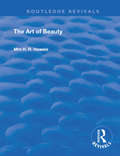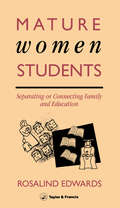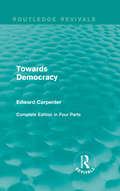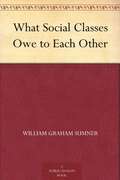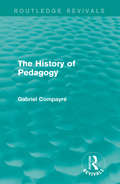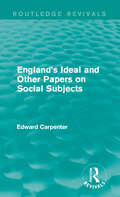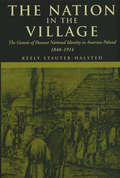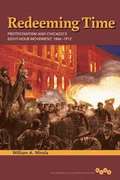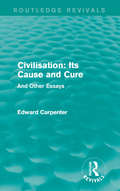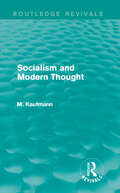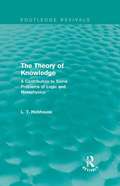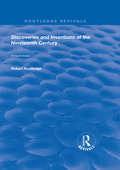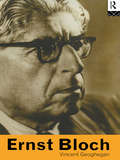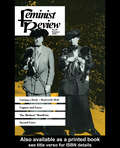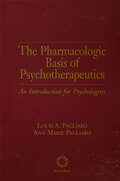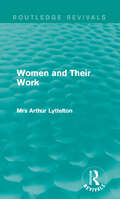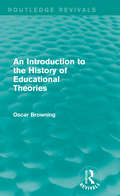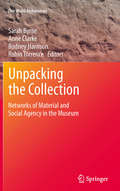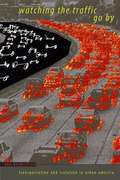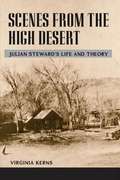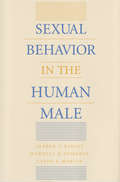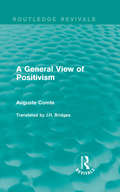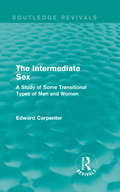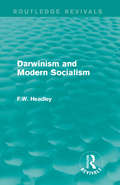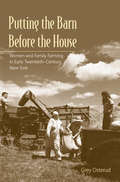- Table View
- List View
The Art of Beauty (Routledge Revivals)
by H. R. HaweisThis book was originaly published in 1878. The Culture of beauty is everywhere a legitimate art. But the beauty and adornment of the human form, the culture of personal beauty, is of the first interest and importance. This book explores the art of beauty, including chapters on the pleasure of beauty, the importance of dress, and the moralities of dress.
Mature Women Students: Separating Of Connecting Family And Education (Gender And Society Ser.)
by Rosalind Edwards South Bank University.First Published in 1993. Routledge is an imprint of Taylor & Francis, an informa company.
Towards Democracy (Routledge Revivals: The Collected Works of Edward Carpenter)
by Edward CarpenterEdward Carpenter’s Towards Democracy is well-known as a starting point of his later work. Originally written in 1881 whilst taking a break from lecturing in Universities across the UK, this four-volume poem dwells mainly on themes of freedom and equality; values that Carpenter wrote upon many times in his career. Originally published in 1883, this version in 1917, this title will be of interest to students of Sociology and English Literature.
What Social Classes Owe to Each Other (1883)
by William Graham SumnerWilliam Graham Sumner (October 30, 1840 - April 12, 1910) was a classical liberal (now a branch of ''libertarianism'' in American political philosophy) American social scientist. He taught social sciences at Yale, where he held the nation's first professorship in sociology. He was one of the most influential teachers at Yale or any major schools. <p><p>Sumner was a polymath with numerous books and essays on American history, economic history, political theory, sociology, and anthropology. He supported laissez-faire economics, free markets, and the gold standard. He adopted the term "ethnocentrism" to identify the roots of imperialism, which he strongly opposed. He was a spokesman against imperialism and in favor of the "forgotten man" of the middle class, a term he coined. He had a long-term influence on conservatism in the United States. <p><p>Sumner wrote an autobiographical sketch for the fourth of the histories of the Class of 1863 Yale College. In 1925, Rev. Harris E. Starr, class of 1910 Yale Department of Theology, published the first full length biography of Sumner. A second full length biography by Bruce Curtis was published in 1981. Other authors have included biographical information about Sumner as shown by citations in this "Biography" section. Sumner was born in Paterson, New Jersey, on October 30, 1840. His father, Thomas Sumner, was born in England and immigrated to the United States in 1836. His mother, Sarah Graham, was also born in England. She was brought to the United States in 1825 by her parents. Sumner's mother died when he was eight.
The History of Pedagogy (Routledge Revivals)
by Gabriel CompayréPayne’s translation of Compayré’s The History of Pedagogy was initially published in 1886 due to a general lack of historical texts on education in the late nineteenth century. Compayré provides a thorough account of the doctrines and methods used by educators throughout history from educators of antiquity to the early nineteenth century. This text focusses on key thinkers and teachers such as Locke, Luther and Kant as well as considering the educational methods of the Greeks and the Romans. This title will be of interest to students of Education and Philosophy.
England's Ideal and Other Papers on Social Subjects: And Other Papers On Social Subjects (1895) (Routledge Revivals: The Collected Works of Edward Carpenter)
by Edward CarpenterOriginally published in 1887, Edward Carpenter’s England’s Ideal and other Papers on Social Subjects is a collection of his essays in the field of Social Science with a focus on English society at the time of writing. His writing was so influential that there was a near constant demand in the late nineteenth and early twentieth centuries for this work to be reprinted with this particular edition being published in 1919. Papers included in this volume discuss issues such as labour, trade and property and all provide insight into the English class structure as well as illuminating Carpenter’s socialist values. This title will be of interest to students of sociology.
The Nation in the Village: The Genesis of Peasant National Identity in Austrian Poland, 1848–1914
by Keely Stauter-HalstedHow do peasants come to think of themselves as members of a nation? The widely accepted argument is that national sentiment originates among intellectuals or urban middle classes, then "trickles down" to the working class and peasants. Keely Stauter-Halsted argues that such models overlook the independent contribution of peasant societies. She explores the complex case of the Polish peasants of Austrian Galicia, from the 1848 emancipation of the serfs to the eve of the First World War. In the years immediately after emancipation, Polish-speaking peasants were more apt to identify with the Austrian Emperor and the Catholic Church than with their Polish lords or the middle classes of the Galician capital, Cracow. Yet by the end of the century, Polish-speaking peasants would cheer, "Long live Poland" and celebrate the centennial of the peasant-fueled insurrection in defense of Polish independence. The explanation for this shift, Stauter-Halsted says, is the symbiosis that developed between peasant elites and upper-class reformers. She reconstructs this difficult, halting process, paying particular attention to public life and conflicts within the rural communities themselves. The author's approach is at once comparative and interdisciplinary, drawing from literature on national identity formation in Latin America, China, and Western Europe. The Nation in the Village combines anthropology, sociology, and literary criticism with economic, social, cultural, and political history.
Redeeming Time: Protestantism and Chicago's Eight-Hour Movement, 1866-1912
by William A. MirolaDuring the struggle for the eight-hour workday and a shorter workweek, Chicago emerged as an important battleground for workers in "the entire civilized world" to redeem time from the workplace in order to devote it to education, civic duty, health, family, and leisure. William A. Mirola explores how the city's eight-hour movement intersected with a Protestant religious culture that supported long hours to keep workers from idleness, intemperance, and secular leisure activities. Analyzing how both workers and clergy rewove working-class religious cultures and ideologies into strategic and rhetorical frames, Mirola shows how every faith-based appeal contested whose religious meanings would define labor conditions and conflicts. As he notes, the ongoing worker-employer tension transformed both how clergy spoke about the eight-hour movement and what they were willing to do, until intensified worker protest and employer intransigence spurred Protestant clergy to support the eight-hour movement even as political and economic arguments eclipsed religious framing. A revealing study of an era and a movement, Redeeming Time illustrates the potential--and the limitations--of religious culture and religious leaders as forces in industrial reform.
Civilisation: And Other Essays (Routledge Revivals: The Collected Works of Edward Carpenter)
by Edward CarpenterThis volume, originally published in 1889 with this edition published in 1912, contains Carpenter's famous essays on civilisation and his theory that it is a disease of mankind that must be cured. Papers included in this collection discuss the rampant ill-health suffered by society as well as criticisms of modern science to support this theory whilst also analysing what the future holds for science, ideas of morality and traditions and customs. This title will be of interest to students of sociology.
Socialism and Modern Thought (Routledge Revivals)
by M. KaufmannOriginally published in 1895, this title provides fascinating insights into the development of socialism in the decades prior to the explosion of 20th century socialist revolutions. Kaufmann examines the influences of Christian ideas and European society on socialism to give a fuller picture of the movement at the turn of the century as well as offers his predictions for the future of socialism in Europe. This title is ideal for students of sociology and history, particularly students interested in the development of modern intellectual movements.
The Theory of Knowledge: A Contribution to Some Problems of Logic and Metaphysics (Routledge Revivals)
by L. T. HobhouseL. T. Hobhouse (1864-1929) was fundamental to the New Liberal movement of the late nineteenth and early twentieth century. He authored many important works in the fields of philosophy, economics and social liberalism. First published in 1896, The Theory of Knowledge considers the content and validity of knowledge, and the conditions on which our understanding of knowledge is based. It is a rich and important classic, which remains of value to students and academics with an interest in sociology, anthropology and the philosophy of logic.
Discoveries and Inventions of the Ninteenth Century (Routledge Revivals)
by Robert RoutledgePublished in 1900. From Atoms to Warships and everything in between, Robert Routledge lists a vast and varied illustrated collection of the revolutionary advances in engineering and pioneering discoveries of the 19th century.
Ernst Bloch
by Vincent GeogheganErnst Bloch is perhaps best known for his subtle and imaginative investigation of utopias and utopianism, but his work also provides a comprehensive and insightful analysis of western culture, politics and society. Yet, because he has not been one of easiest of writers to read his full contribution has not been widely acknowledged. Block developed a complex conceptual framework, and presented this in a prose style which many have found to verge on the impenetrable. In this critical and accessible introduction to one of the most fascinating thinkers of the twentieth century, Vincent Geoghegan unravels much of the mystery of the man and his ideas.
Feminist Review: Issue 35
by The Feminist The Feminist Review CollectiveThis issue will cover the wide range of topics for which the journal is known and on which it has built its readership, rather than being a thematic issue.
The Pharmacologic Basis of Psychotherapeutics: An Introduction For Psychologists
by Louis A. Pagliaro Ann M. PagliaroFirst published in 1998. Routledge is an imprint of Taylor & Francis, an informa company.
Women and Their Work (Routledge Revivals)
by Mrs Arthur LytteltonFirst published in 1901, this title lends insight into the position of English women in the workforce at the turn of the twentieth century. The conditions of women changed rapidly throughout the 1800s, leading to more varied choices in terms of career and lifestyle. However, this title also reveals the limited status of women even one hundred years ago, as Lyttleton urges that women must decide between a family life and a career. Women and Their Work will be of interest to students of Sociology, Women’s History, and Gender Studies.
An Introduction to the History of Educational Theories (Routledge Revivals)
by Oscar BrowningAn Introduction to the History of Educational Theories, first published in 1881, offers a comprehensive overview of the most notable approaches to education throughout Western history, from Athens and Rome to the Victorian public school. Exploring not only the still famous theories of Plato and Aristotle, this work also touches on techniques in education which are either no longer prevalent – Roman Oratory, the Jesuits – or in some cases were never widely adopted or appreciated: John Milton, for example. This title will be of value to those intrigued by the potential of past attitudes for present-day application, as well as to those unconvinced by contemporary approaches.
Unpacking the Collection
by Rodney Harrison Anne Clarke Sarah Byrne Robin TorrenceMuseum collections are often perceived as static entities hidden away in storerooms or trapped behind glass cases. By focusing on the dynamic histories of museum collections, new research reveals their pivotal role in shaping a wide range of social relations. Over time and across space the interactions between these artefacts and the people and institutions who made, traded, collected, researched and exhibited them have generated complex networks of material and social agency. In this innovative volume, the contributors draw on a broad range of source materials to explore the cross-cultural interactions which have created museum collections. These case studies contribute significantly to the development of new theoretical frameworks to examine broader questions of materiality, agency, and identity in the past and present. Grounded in case studies from individual objects and museum collections from North America, Europe, Africa, the Pacific Islands, and Australia, this truly international volume juxtaposes historical, geographical, and cross-cultural studies. This work will be of great interest to archaeologists and anthropologists studying material culture, as well as researchers in museum studies and cultural heritage management.
Watching the Traffic Go By: Transportation and Isolation in Urban America
by Fotsch Paul MasonAs twentieth-century city planners invested in new transportation systems to deal with urban growth, they ensured that the automobile rather than mass transit would dominate transportation.<P><P> Combining an exploration of planning documents, sociological studies, and popular culture, Paul Fotsch shows how our urban infrastructure developed and how it has shaped American culture ever since. <P> Watching the Traffic Go By emphasizes the narratives underlying our perceptions of innovations in transportation by looking at the stories we have built around these innovations. Fotsch finds such stories in the General Motors "Futurama" exhibit at the 1939 World's Fair, debates in Munsey's magazine, films such as Double Indemnity, and even in footage of the O. J. Simpson chase along Los Angeles freeways. <P> Juxtaposed with contemporaneous critiques by Lewis Mumford, Theodor Adorno, and Max Horkheimer, Fotsch argues that these narratives celebrated new technologies that fostered stability for business and the white middle class. At the same time, transportation became another system of excluding women and the poor, especially African Americans, by isolating them in homes and urban ghettos.
Scenes from the High Desert: Julian Steward's Life and Theory
by Virginia KernsJulian Steward (1902-72) is best remembered in American anthropology as the creator of cultural ecology, a theoretical approach that has influenced generations of archaeologists and cultural anthropologists. Virginia Kerns considers the intellectual and emotional influences of Steward's remarkable career, exploring his early life in the American West, his continued attachments to western landscapes and inhabitants, his research with Native Americans, and the writing of his classic work, Theory of Culture Change. With fluid prose and rich detail, the book captures the essence and breadth of Steward's career while carefully measuring the ways he reinforced the male-centered structure of mid-twentieth-century American anthropology.
Sexual Behavior in the Human Male
by Alfred C. KinseyWhen published in 1948 this volume encountered a storm of condemnation and acclaim. It is, however, a milestone on the path toward a scientific approach to the understanding of human sexual behavior. Dr. Alfred C. Kinsey and his fellow researchers sought to accumulate an objective body of facts regarding sex. They employed first hand interviews to gather this data. This volume is based upon histories of approximately 5,300 males which were collected during a fifteen year period. This text describes the methodology, sampling, coding, interviewing, statistical analyses, and then examines factors and sources of sexual outlet.
A General View of Positivism: Large Print (Routledge Revivals)
by Auguste ComteIn Comte’s original work on positivism, he attempted to outline a general perception of positivism, how it can be applied to society and how society would work should positivism be applied. J.H. Bridges’ translation, originally published in 1865, this version first published in 1908, manages to simplify and clarify Comte’s views of positivism and how it is related to the thoughts, feelings and actions of humankind as well as how positivism can be applied to philosophy, politics, industry, poetry, the family and the future. This title will be of interest to students of sociology and philosophy.
The Intermediate Sex: A Study of Some Transitional Types of Men and Women (Routledge Revivals: The Collected Works of Edward Carpenter)
by Edward CarpenterThe Intermediate sex collates papers from Edward Carpenter on his ideas about intermediate types. Carpenter claims that there are those in societies who hold an intermediate position between the two sexes and may have an inner sex in their mind that is different from their biological sex. Originally published in 1908, this version in1941, these papers present early observations about gender fluidity in both men and women, studying certain ‘types’ of intermediate people that he claimed were begin to emerge more obviously at the time of writing. This title will be of interest to students of gender studies.
Darwinism and Modern Socialism (Routledge Revivals)
by F.W. HeadleyAn adamant fan of Darwin, F.W. Headley attempts to argue the difficulties of believing in Socialism and Darwinism simultaneously and highlights issues which could prevent Socialism from being put into practice. Originally published in 1909, this study uses examples of communities in countries such as England and India to illustrate Headley’s key belief that societies only function well if they do not interfere with the fight for existence and natural selection. This title will be of interest to students of Philosophy, Sociology and Anthropology.
Putting the Barn Before the House: Women and Family Farming in Early Twentieth-Century New York
by Grey OsterudPutting the Barn Before the House features the voices and viewpoints of women born before World War I who lived on family farms in south-central New York. As she did in her previous book, Bonds of Community, for an earlier period in history, Grey Osterud explores the flexible and varied ways that families shared labor and highlights the strategies of mutuality that women adopted to ensure they had a say in family decision making. Sharing and exchanging work also linked neighboring households and knit the community together. Indeed, the culture of cooperation that women espoused laid the basis for the formation of cooperatives that enabled these dairy farmers to contest the power of agribusiness and obtain better returns for their labor. Osterud recounts this story through the words of the women and men who lived it and carefully explores their views about gender, labor, and power, which offered an alternative to the ideas that prevailed in American society. Most women saw "putting the barn before the house"-investing capital and labor in productive operations rather than spending money on consumer goods or devoting time to mere housework-as a necessary and rational course for families who were determined to make a living on the land and, if possible, to pass on viable farms to the next generation. Some women preferred working outdoors to what seemed to them the thankless tasks of urban housewives, while others worked off the farm to support the family. Husbands and wives, as well as parents and children, debated what was best and negotiated over how to allocate their limited labor and capital and plan for an uncertain future. Osterud tells the story of an agricultural community in transition amid an industrializing age with care and skill.
